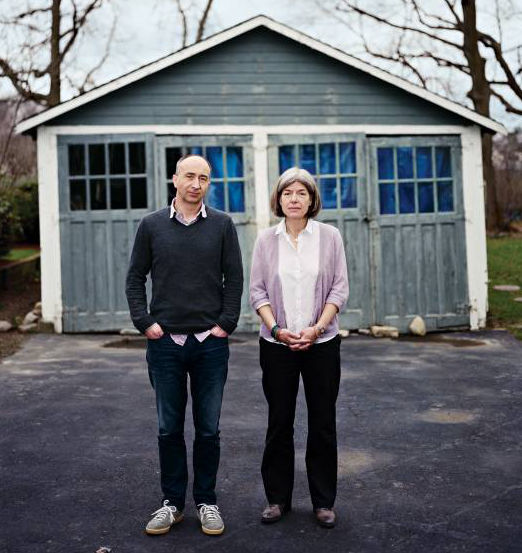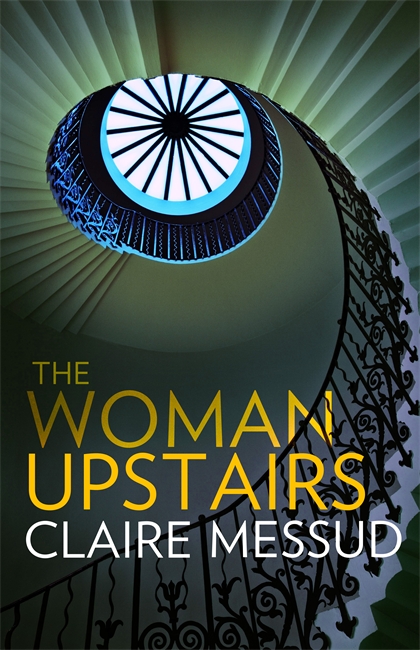Why Claire “Badass” Messud Is The Hot Ticket At Sydney Writers’ Festival
Claire Messud will be in Sydney this month off the back of her brilliant new book, The Woman Upstairs. We can't wait.

Last week, American author Claire Messud achieved a rare feat: she made headlines for talking about a book that is not part of the Twilight, Fifty Shades or A Song of Ice and Fire series. And all she did was answer a question.
Publishers Weekly’s Annasue McCleave Wilson told Messud she wouldn’t want to be friends with Nora, the narrator of her new book The Woman Upstairs, because “her outlook is almost unbearably grim.” In response, Messud was alight with exasperation:
“For heaven’s sake, what kind of question is that? Would you want to be friends with Humbert Humbert? Would you want to be friends with Mickey Sabbath? Saleem Sinai? Hamlet? Krapp? Oedipus? Oscar Wao? Antigone? Raskolnikov? Any of the characters in The Corrections? Any of the characters in Infinite Jest? Any of the characters in anything Pynchon has ever written? Or Martin Amis? Or Orhan Pamuk? Or Alice Munro, for that matter? If you’re reading to find friends, you’re in deep trouble. “
She goes on, but that’s the bit that got the class chattering. The usual suspects unleashed a spasm of blog posts – Salon and The Guardian were among those who chimed in, with Slate asking, “Was novelist Claire Messud right to imply her interviewer was sexist?”
And Slate was kind of on to something. As the interview is presented on the PW website (where, oddly, it seems only to consist of two questions), Messud was the one playing the gender card. Nowhere in her comment does Wilson raise the fact Nora has a vagina. (Disclaimer: I have a penis. Hopefully that doesn’t preclude me from writing about gender; if you think it does, at least be civil in the comments? The Internet is ugly enough.) In crying “sexism”, Messud gave a response that cuts both ways. Firstly, Wilson asked a dumb question. More to the point, Messud’s Molotov cocktail of an answer illustrates a far more nettlesome issue than her narrator’s likability: women like her may be writing some of the best fiction on the market today, but they’re still fighting a pitched battle against lingering literary-world tendencies — in this case, a reflexive urge to shrink away from tough, complex, hard-to-love female characters, or disavow them altogether.
Who Is This Claire Messud?
Messud’s latest work was always going to warrant close inspection. If not a household name, she’s got the cred. Her 1995 debut novel, When the World Was Steady, was nominated for a PEN/Faulkner Award. In 2006, she finally broke out (and earned her first bestseller) with The Emperor’s Children, about a group of pampered 30-somethings in Noughties New York City. It was shortlisted for a Man Booker and often referred to as the first authoritative novel about post-9/11 Manhattan. Messud is also the wife of The New Yorker’s fiction critic, British-born James Wood. A recent New York profile of the duo referred to them as the First Couple of American Fiction. It was illustrated with a plainspoken photograph of the couple looking not unlike John Gregory Dunne and wife Joan Didion in their heyday. No pressure, then.

When I first read The Woman Upstairs in March, I sensed it would go on to make noise. Maybe not a Harry Potter-level sonic boom, but an incessant buzz — the kind that builds as people discover a word-of-mouth hit with a riveting and provocative female voice at its centre. (And that isn’t, it bears repeating, from the Fifty Shades series.) Think of recent smashes about women on the verge, pulpy page-turners like Gillian Flynn’s Gone Girl or Zoe Heller’s Notes On A Scandal.
Messud’s protagonist — if you can call her that — is Nora Eldridge, a third grade teacher in Cambridge, Massachusetts who, in her spare time, constructs tiny dioramas mimicking the working spaces of her muses (Emily Dickinson, Virginia Woolf and Edie Sedgwick… sensing a pattern?). On the outside, she seems like any other well-meaning, professional woman who’s figured things out. On the inside? We may be approaching Alex Forrest territory.
Nora is single. She’s in her early 40s. As such, she’s lonely — and dangerously, thrillingly aware of how furious this makes her. “It was supposed to say ‘Great Artist’ on my tombstone,” she confides, “but if I died right now it would say ‘such a good teacher/daughter/friend’ instead; and what I really want to shout, and want in big letters on that grave, too, is FUCK YOU ALL.”
That’s just the end of the second paragraph. A few pages later, things get oogy when Nora meets eight-year-old Reza Shahid, whose parents have moved to Cambridge for a year, and becomes almost pathologically obsessed with her new student: “I loved his nape, the carefully marshaled black curls lapping their uneven shoreline along the smooth, frail promontory of his neck.” Soon Nora has staked her claim as the unofficial fourth member of the tight-knit Shahid clan, infiltrating their lives with an assuredness that goes from sycophantic to scary as the book progresses.
It’s discomfiting stuff. And while I wouldn’t call her unbearably grim, Nora is certainly weird. Weird in the way we’re all weird.
Which may be what Wilson was really trying to say. It’s not Nora’s dyspepsia that’s the problem, and whether she’s batshit isn’t necessarily the point – as Messud rightly indicates, narrators like Nora are a literary tradition in no danger of extinction. It’s how Nora behaves as she entangles herself into the Shahids’ lives that is at the heart of all this chatter.
It’s also what makes her such a lightning rod. Readers squirm because Nora mirrors so many of the most embarrassing instincts we exhibit when we’re in thrall to someone new. Think about the commitment you throw into crafting a perfectly witty email to charm a crush into hanging out again. The ungodly amount of time you spend clicking through an intriguing co-worker’s Facebook photo albums. Or those irrational pangs of jealousy that rouse when you discover a new friend is still spending time with an older (better?) inner circle you have yet to infiltrate. New relationships – platonic or not – are also negotiations fraught with excitement and expectation; eventually, we accept the infatuation will cool. Nora’s only grows hotter, and it burns for 300 riveting pages.

That is the cover. It is awful. But you shouldn’t let that dissuade you from reading The Woman Upstairs. And don’t let the noise being made by Messud, her cheerleaders and detractors distract from what’s really happening here. People are talking because this extraordinary book demands a response at a chaotic cultural moment for women. CEOs like Marissa Meyer and Sheryl Sanberg are walking litmus tests for the limits of lady leadership, and the term “work/life balance” (ugh) seems to worm its way into every publication, website and blog with a remotely female bent. Nora Eldridge blasts in with little decorum and tells, yes, some unspeakably grim truths about women and motherhood and careerism and the kind of madness we all temper, every morning, when we leave our houses and go out in the world with our game faces on.
And then the person who created her gets told she isn’t likable? It’s no wonder she got tetchy.
And She’s Coming Down Under:
Messud will be in Australia – where she briefly lived as a child – to headline the annual Sydney Writers’ Festival later this month. She’ll participate in two panels (one will intriguingly cover her approach “to writing about the search for fulfilment and compromised dreams”), and is slated to give the closing address.
The events of the past week will, no doubt, inform what she has to say. So too may the Boston Marathon attacks, which are likely to arise given The Woman Upstairs’ Cambridge setting, Messud’s literary relationship with 9/11, and the Shahid’s deceptively comfortable multiculturalism.
No word yet on whether she will be taking questions from the audience, but just in case she does? Think carefully about what you ask.
–
CLAIRE MESSUD AT SYDNEY WRITERS’ FESTIVAL
Claire Messud: The Women Upstairs
When: Friday May 24, 2.30pm @ Pier 2/3 Main Stage
What: Claire Messud speaks to Caroline Baum about The Woman Upstairs.
When: Saturday May 25, 10am @ Pier 2/3 Main Stage
What: Claire Messud (The Woman Upstairs), Georgia Blain (The Secret Lives of Men) and Cate Kennedy (A House on Fire), all weave stories that resonate long after they finish, delving into the truth of human nature – our motivations, desires, shortcomings and defining moments. In a discussion with Monica Dux (Things I Didn’t Expect (When I was Expecting), they’ll discuss their approaches to writing about the search for fulfilment and compromised dreams.
Closing Address: Claire Messud
When: Sunday May 26, 4.30pm @ Sydney Theatre, Walsh Bay
What: Claire Messud will speak about a writer’s rootlessness in the global era, and the underpinning importance of ‘imaginary homelands’ — including this one — in her storytelling.
For more of Sydney Writers’ Festival, which runs from May 20-26, click here.
–
Nicholas Fonseca has just finished up as the acting deputy editor of Madison, and is a (sometime) master of film studies student at the University of Sydney. Prior to arriving in Sydney, he was based in New York City, where he worked for a decade as a writer and senior editor for Entertainment Weekly.
Feature photo credit: Lisa Cohen